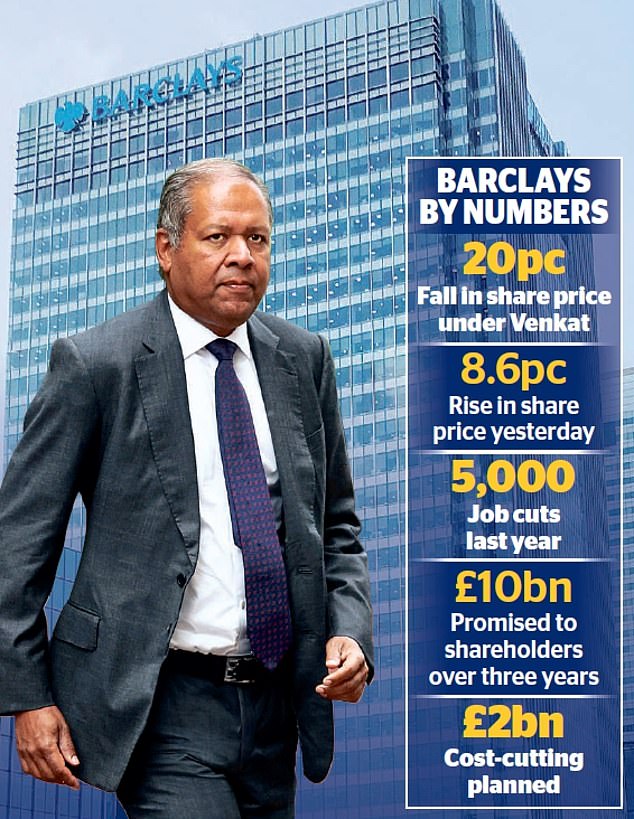The head of Barclays praised Britain’s “resilient” economy as he outlined a three-year recovery plan aimed at reviving the bank’s dismal share price performance.
The lender is targeting £2bn in cost savings and £10bn in dividends and share buybacks, as well as a restructuring of the group into five business units.
Barclays – which last year cut 5,000 jobs from its global workforce – did not give any details on how many more would be cut as a result of its further belt-tightening.
The lender’s beleaguered investment banking arm will continue to grow – but shrink as a proportion of the business – as it shifts its focus to more profitable corporate and consumer operations.
Chief CS Venkatakrishnan – known as Venkat – also said his aim was to take advantage of the group’s position as the world’s largest investment bank outside the United States, operating in major global financial centres.
Recovery plan: Barclays, led by boss Venkat (pictured), is targeting £2bn in savings and £10bn in dividends and buybacks.
Amid persistent speculation about the division’s future, Venkat insisted: “It is an important part of Barclays and will remain so.”
It also put Britain at the center of the group’s plans with a £30 billion boost to lending allocated to its British arm, including a goal to revive credit cards and other consumer loans.
Those plans will be bolstered by the recent acquisition of Tesco’s banking operations, although Venkat did not directly address the question of whether some of the newly acquired company’s 2,800 employees will keep their jobs, saying it was still “very early”.
At the same time, Barclays will end its retail presence in the EU by exiting consumer banking in Germany and continuing with a previously announced plan to divest its mortgage portfolio in Italy.
Venkat said: ‘The UK has proven to be resilient, we believe it is a great consumer economy. We are very, very optimistic about the UK as a place to do business and from which to do business.
“I’m hopeful that it’s not just about the consumer economy in the UK, but also the business economy.”
He acknowledged that it would “take some time” to restore Britain’s “stock market culture” and revive the market for new listings.
Those comments came amid concerns about low valuations of UK-listed companies. “This is the beginning of a longer journey,” Venkat added.
The restructuring came as Barclays reported a 6 per cent drop in annual profits to £6.6 billion as it took a £927 million hit from restructuring costs, while revenue from the global markets and investment banking fees fell. Shares rose 8.6 percent but are down 20 percent since Venkat took over in 2021.
RBC Capital Markets analyst Benjamin Toms reacted cautiously to the latest update.
“The market likely wants to see tangible progress before rewarding the bank with a higher valuation multiple,” he said.

